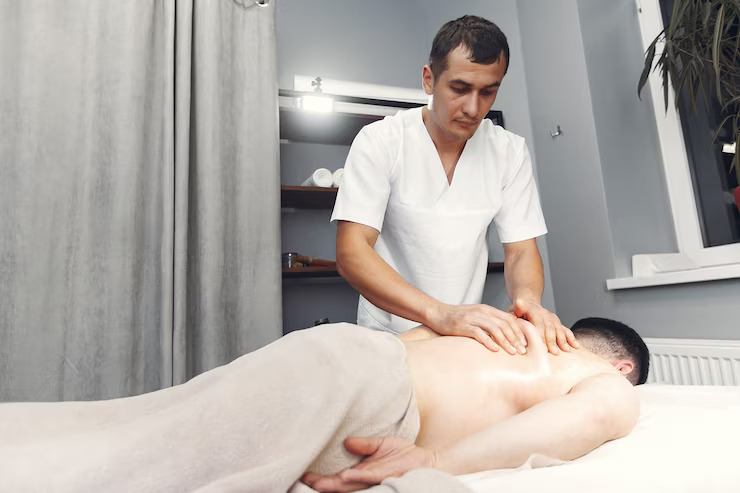Have you ever wondered how long the effects of a massage last? In our latest article, we delve into this question and provide you with all the information you need. As a blog run by massage therapists and enthusiasts, we are passionate about sharing our knowledge and helping others who are just as enthusiastic about giving and receiving massages. So if you’re curious about the lasting benefits of a massage, keep reading!
In this article, we will discuss the various factors that can influence how long the effects of a massage last. We will explore the different types of massages and their potential benefits, as well as the individual factors that can affect how long you can feel the benefits. Whether you’re someone who enjoys regular massages or someone considering trying it out for the first time, understanding how long the effects of a massage last can help you plan your self-care routine more effectively. So buckle up and get ready to dive into the world of massage therapy!

This image is property of sandradiazmassage.com.
Benefits of Massage Therapy
Massage therapy is a popular and effective way to relax and rejuvenate the body and mind. Whether you are seeking physical, mental, or emotional benefits, massage can provide numerous advantages to your overall well-being. In this article, we will explore the different effects of massage and how long these effects typically last.
Physical Benefits of Massage
Massage has several physical benefits that can positively impact your body. One of the immediate physical effects of massage is muscle tension and pain relief. The kneading and manipulation of your muscles can help relieve knots and tightness, resulting in reduced discomfort and improved range of motion.
Another physical benefit of massage is improved circulation and lymphatic drainage. The pressure applied during a massage session helps stimulate blood flow, which can enhance the delivery of oxygen and nutrients to your muscles and organs. Additionally, the manual manipulation of your lymphatic system can help remove toxins and waste products from your body, promoting a healthier immune system.
Mental and Emotional Benefits of Massage
In addition to the physical benefits, massage also offers mental and emotional benefits. One of the immediate effects of massage is relaxation and stress reduction. The soothing touch and focused attention during a massage session can help calm your mind and release tension, resulting in a sense of relaxation and tranquility.
Massage therapy has also been found to have a positive impact on your mental well-being. Regular massage sessions can reduce symptoms of anxiety and depression, promote better sleep patterns, and boost overall mood. The release of endorphins during a massage can also contribute to a sense of happiness and well-being.
Effects of Massage on the Body
The effects of massage on the body can vary depending on the individual and the specific techniques used during the session. However, in general, the physical effects of massage can last for a few hours to a few days.
One of the short-term effects of massage is immediate relaxation and stress reduction. After a massage session, you may feel a deep sense of relaxation and tranquility. This state of relaxation can last for several hours, allowing you to enjoy a peaceful and rejuvenated state of mind.
Another short-term effect of massage is improved circulation and lymphatic drainage. The increased blood flow and lymphatic stimulation can have immediate benefits, such as reduced muscle soreness and improved detoxification. These effects may last for a few hours or even up to a day after the massage.
Massage therapy can also provide short-term relief from muscle tension and pain. The manipulation of muscles and soft tissues can help release knots and tightness, providing immediate relief. However, the duration of pain relief may vary depending on the severity of the condition and the individual’s response to the massage.
Effects of Massage on the Mind
In addition to the physical effects, massage can also have long-lasting effects on your mental well-being. The mental benefits of massage can range from improved focus and clarity to reduced symptoms of anxiety and depression.
One of the medium-term effects of massage is improved range of motion and flexibility. Regular massage sessions can help loosen tight muscles and improve joint mobility, resulting in better overall flexibility and range of motion. These effects may last for several days or even weeks, depending on the individual’s lifestyle and any underlying conditions.
Massage therapy can also enhance athletic performance. By reducing muscle tension and improving flexibility, massage can help athletes perform better and prevent injuries. This medium-term effect of massage can be maximized with regular sessions and proper recovery practices.
Long-Term Effects of Massage
Moreover, the long-term effects of massage can greatly contribute to your overall well-being. Regular massage therapy can have a positive impact on various aspects of your life, including reduced chronic pain, better sleep patterns, boosted immune system, and improved mental well-being.
Massage therapy has been found to be beneficial in reducing chronic pain. By targeting specific areas of tension and repetitive motion, massage can help alleviate pain caused by conditions like arthritis or fibromyalgia. The duration of pain relief may vary depending on the severity of the condition, but regular massage sessions can provide significant long-term benefits.
In addition, massage therapy can promote better sleep patterns. The relaxation and stress reduction effects of massage can help quiet your mind and relax your body, making it easier to fall asleep and improving the quality of your sleep. Regular massage sessions can establish a healthy sleep routine and contribute to better overall sleep patterns.
Massage therapy has also been found to boost the immune system. The increased blood flow and lymphatic drainage during a massage can help remove toxins and waste products from your body, which can support a healthier immune system. Regular massage sessions can strengthen your body’s defense mechanisms and reduce the risk of illnesses.
Furthermore, the improved mental well-being is one of the long-term effects of massage. The relaxation and stress reduction benefits, combined with the release of endorphins, can contribute to improved mood and reduced symptoms of anxiety and depression. Regular massage sessions can help you maintain a positive mental state and improve your overall well-being.
Factors Affecting the Duration of Massage Effects
Several factors can affect the duration of massage effects. Individual response to massage can vary, with some people experiencing longer-lasting benefits compared to others. Furthermore, the frequency and regularity of massage sessions can play a role in how long the effects last. Regular sessions are more likely to provide longer-lasting benefits compared to occasional treatments.
Additionally, the type and intensity of massage techniques used can also impact the duration of effects. Deep tissue massage, for example, may provide longer-lasting results compared to a lighter Swedish massage. The duration of effects is also influenced by the underlying conditions and lifestyle factors of the individual.
Massage as a Maintenance Practice
To enjoy the maximum benefits of massage therapy, regular sessions are recommended. Massage can be considered a maintenance practice for your overall well-being.
The benefits of regular massage include sustained relaxation and stress reduction, improved circulation and lymphatic drainage, reduced muscle tension and pain, enhanced range of motion and flexibility, better athletic performance, reduced chronic pain, improved sleep patterns, boosted immune system, and improved mental well-being. By incorporating massage into your routine, you can maintain these benefits and support a healthier lifestyle.
The recommended frequency of massage sessions may vary depending on individual needs and goals. For general maintenance and stress reduction, a monthly massage session can be beneficial. However, if you are seeking specific therapeutic benefits or addressing chronic pain, more frequent sessions may be necessary.
In conclusion, the effects of massage can vary depending on the individual and the specific techniques used. While some effects may be immediate and short-term, others can provide long-lasting benefits to your overall well-being. By incorporating regular massage sessions into your routine, you can enjoy sustained relaxation, improved physical health, and enhanced mental well-being. So, why not treat yourself to the benefits of massage therapy and experience the lasting effects it can provide for your body and mind?
Remember, the effects of massage can vary, and it’s important to consult with a licensed massage therapist to determine the best approach for your specific needs.
